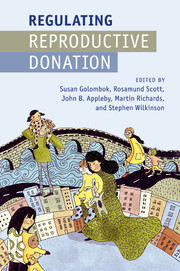36 results
Chapter 29 - Research on Assisted Reproduction Families: A Historical Perspective
-
-
- Book:
- In-Vitro Fertilization
- Published online:
- 09 June 2018
- Print publication:
- 14 June 2018, pp 232-239
-
- Chapter
- Export citation
Index
-
- Book:
- Regulating Reproductive Donation
- Published online:
- 05 March 2016
- Print publication:
- 01 April 2016, pp 373-382
-
- Chapter
- Export citation
13 - Thoughts and feelings about the donor
- from Part IV - Information about donors
-
-
- Book:
- Regulating Reproductive Donation
- Published online:
- 05 March 2016
- Print publication:
- 01 April 2016, pp 293-310
-
- Chapter
- Export citation
Part I - International, cross-border and global issues
-
- Book:
- Regulating Reproductive Donation
- Published online:
- 05 March 2016
- Print publication:
- 01 April 2016, pp 37-162
-
- Chapter
- Export citation
Contents
-
- Book:
- Regulating Reproductive Donation
- Published online:
- 05 March 2016
- Print publication:
- 01 April 2016, pp v-vii
-
- Chapter
- Export citation
Part IV - Information about donors
-
- Book:
- Regulating Reproductive Donation
- Published online:
- 05 March 2016
- Print publication:
- 01 April 2016, pp 291-372
-
- Chapter
- Export citation
Editors, contributors and discussants
-
- Book:
- Regulating Reproductive Donation
- Published online:
- 05 March 2016
- Print publication:
- 01 April 2016, pp viii-ix
-
- Chapter
- Export citation
Copyright page
-
- Book:
- Regulating Reproductive Donation
- Published online:
- 05 March 2016
- Print publication:
- 01 April 2016, pp iv-iv
-
- Chapter
- Export citation
Acknowledgements
-
- Book:
- Regulating Reproductive Donation
- Published online:
- 05 March 2016
- Print publication:
- 01 April 2016, pp x-xii
-
- Chapter
- Export citation
Part III - Donors
-
- Book:
- Regulating Reproductive Donation
- Published online:
- 05 March 2016
- Print publication:
- 01 April 2016, pp 205-290
-
- Chapter
- Export citation
Part II - How many children per donor?
-
- Book:
- Regulating Reproductive Donation
- Published online:
- 05 March 2016
- Print publication:
- 01 April 2016, pp 163-204
-
- Chapter
- Export citation
Introduction
-
-
- Book:
- Regulating Reproductive Donation
- Published online:
- 05 March 2016
- Print publication:
- 01 April 2016, pp 1-13
-
- Chapter
- Export citation

Regulating Reproductive Donation
-
- Published online:
- 05 March 2016
- Print publication:
- 01 April 2016
2 - Lesbian mother families
-
- Book:
- Modern Families
- Published online:
- 05 March 2015
- Print publication:
- 09 March 2015, pp 32-69
-
- Chapter
- Export citation
4 - Donor conception families
-
- Book:
- Modern Families
- Published online:
- 05 March 2015
- Print publication:
- 09 March 2015, pp 91-116
-
- Chapter
- Export citation
Dedication
-
- Book:
- Modern Families
- Published online:
- 05 March 2015
- Print publication:
- 09 March 2015, pp vii-viii
-
- Chapter
- Export citation
Acknowledgments
-
- Book:
- Modern Families
- Published online:
- 05 March 2015
- Print publication:
- 09 March 2015, pp xiii-xiv
-
- Chapter
- Export citation
1 - Introduction
-
- Book:
- Modern Families
- Published online:
- 05 March 2015
- Print publication:
- 09 March 2015, pp 1-31
-
- Chapter
- Export citation
Index
-
- Book:
- Modern Families
- Published online:
- 05 March 2015
- Print publication:
- 09 March 2015, pp 261-267
-
- Chapter
- Export citation
8 - Conclusions
-
- Book:
- Modern Families
- Published online:
- 05 March 2015
- Print publication:
- 09 March 2015, pp 192-217
-
- Chapter
- Export citation



